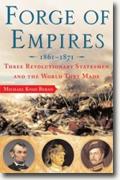Forge of Empires
Michael Knox Beran
book reviews:
· general fiction
· chick lit/romance
· sci-fi/fantasy
· graphic novels
· nonfiction
· audio books
· author interviews
· children's books @
curledupkids.com
· DVD reviews @
curledupdvd.com
newsletter
win books
buy online
links
home
for authors
& publishers
for reviewers

 |
Forge of Empires: Three Revolutionary Statesmen and the World They Made, 1861-1871 Michael Knox Beran Free Press Hardcover 496 pages October 2007 |
|
The 1860’s decade was tumultuous in many ways, though for many Americans the only thing that comes to mind is the Civil War. However, as Michael Knox Beran explores in his book Forge of Empires
Beran explores these three revolutions not only through the eyes of these great and powerful leaders but also through those people caught up in these momentous events. Walt Whitman, Nietzsche, Leo Tolstoy, Mary Chesnut, Napoleon III and his empress Eugenie - all of them play a great role in illustrating the consequences of various actions. While Lincoln frees the slaves and goes to war to save the union, Mary Chesnut, the wife of a Southern landowner, shows us how her society crumbles as the ravages of war reach the Confederacy and obliterate the society that she knew. The rise of Germany and Bismarck’s thirst for power results in huge transformations in France as well, culminating in the Franco-Prussian war that finally solidifies the power of the new German state. Beran uses a form of narrative history in Forge of Empires Forge of Empires As months and years progress, Beran shows us Alexander was a man with big ideas yet without the inability to “sell” these ideas to the Russian people. Rebellion is widespread and there are many attempts on his life, which results in a crackdown and even less freedom. The mechanism of freeing the serfs results in many serfs suffering even more greatly than they did under serfdom, and the revolution that Alexander started swiftly spins out of his control. Meanwhile, we see the effects of Lincoln’s revolution as it affects countries all over Europe. Will England and France recognize the Confederacy, or will Lincoln and the Union army be able to achieve a military victory that will keep them to the sidelines? And what’s Bismarck doing during all this? The only major fault with Forge of Empires One minor thing is that, in exploring the lives of the other people (not Lincoln, Bismarck, or Alexander), Beran occasionally seems to go off on a tangent about their romantic lives, or other parts. I realize that Beran is using these instances to illustrate how society is changing, but it just sometimes seems too much. He doesn’t do it often, and most of the time it does meet his goal. But there were times that I simply wanted him to move on. Overall, though, Forge of Empires I encourage you to pick this book up. It’s interesting, you’ll find out a lot about things you may not have known (I’m a history buff, and I had no idea that Prussia and Austria fought a brief war in the mid-1860s). The best thing is that you will get a foundation for much of what happened in the world in the 20th century, told in a fashion that will keep you reading to the final page. Originally published on Curled Up With A Good Book at www.curledup.com. © Dave Roy, 2008 |
|
|
|
 Click here to learn more about this month's sponsor! |
|
| fiction · sf/f · comic books · nonfiction · audio newsletter · free book contest · buy books online review index · links · · authors & publishers reviewers |
|
| site by ELBO Computing Resources, Inc. | |
 Abraham Lincoln, of course, was forcing American society to change drastically, with the effect not only of freeing the slaves but also transforming Southern aristocracy from wealthy land-owning based on slavery to a much different class system. Otto von Bismarck, in turn, was in the process of accumulating power for his native Prussia (and for himself, of course) by uniting the various German states into an empirical power under one ruler, thus stamping his mark on the European balance of power for generations to come. Finally, Russian Tsar Alexander II was implementing policies to end serfdom, throwing Russian society into such upheaval that eventually that sniff of freedom turned into just another dictatorship.
Abraham Lincoln, of course, was forcing American society to change drastically, with the effect not only of freeing the slaves but also transforming Southern aristocracy from wealthy land-owning based on slavery to a much different class system. Otto von Bismarck, in turn, was in the process of accumulating power for his native Prussia (and for himself, of course) by uniting the various German states into an empirical power under one ruler, thus stamping his mark on the European balance of power for generations to come. Finally, Russian Tsar Alexander II was implementing policies to end serfdom, throwing Russian society into such upheaval that eventually that sniff of freedom turned into just another dictatorship.